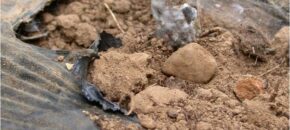In 2022 Rutgers provided growers with regulatory updates in presentations at NJACTS, the Blueberry Open house and South Jersey Vegetable and Field Crop, North & South Jersey Tree Fruit, and Blueberry Twilights. Thanks to all host farms. Lamin… Read More »
Continue reading...Resources for New Jersey Licensed Private Pesticide Applicators & Growers – 2022 Meetings Tools for Regulatory Compliance
Controlling fungal leaf blights of Carrot
Powdery mildew, Alternaria and Cercospora are three important fungal foliar pathogens that can cause early defoliation in carrots, thus reducing yields and making harvest difficult. Each pathogen produces distinct symptoms.
Continue reading...Vegetable IPM Update 7/06/22
Sweet Corn Note: No trap data from the southern counties is available this week, so maps will not appear in this edition. European corn borer (ECB) moths remain a sporadic, low component of blacklight trap catches. Feeding in pre-tassel stage is still present in some areas, but is now less common. ECB injury over the […]
Continue reading...Diagnosing Southern blight and White mold in tomato and pepper

There have been a few reports of Southern blight (Sclerotinia rolfsii) and White mold (Sclerotinia sclerotiorum) on tomato and pepper in New Jersey. Southern blight is much more common in vegetable areas south of the state where summer temperatures remain hotter (above 90°F) for longer periods of time. Like white mold, it can survive in […]
Continue reading...REMINDER: In-Person CORE Meetings in Burlington County

The second ‘CORE Extravaganza’ meeting hosted by Rutgers Cooperative Extension of Burlington County will be held Thursday, July 14, 2022. This is an in-person opportunity for licensed pesticide applicators to earn CORE and recertification credits. The July meeting also offers one (1) category credit for 1A, 10, and PP2. See details below.
Continue reading...Avoiding Plectosporium blight in cucurbit fields in 2022
Plectosporium blight, also known as Microdochium blight or White speck, caused significant problems in some pumpkin fields last summer in New Jersey. The soil-borne fungal pathogen, although somewhat uncommon, can unexpectedly show up in some years and cause significant losses if left uncontrolled. The fungus survives in the soil on decaying plant debris where it […]
Continue reading...